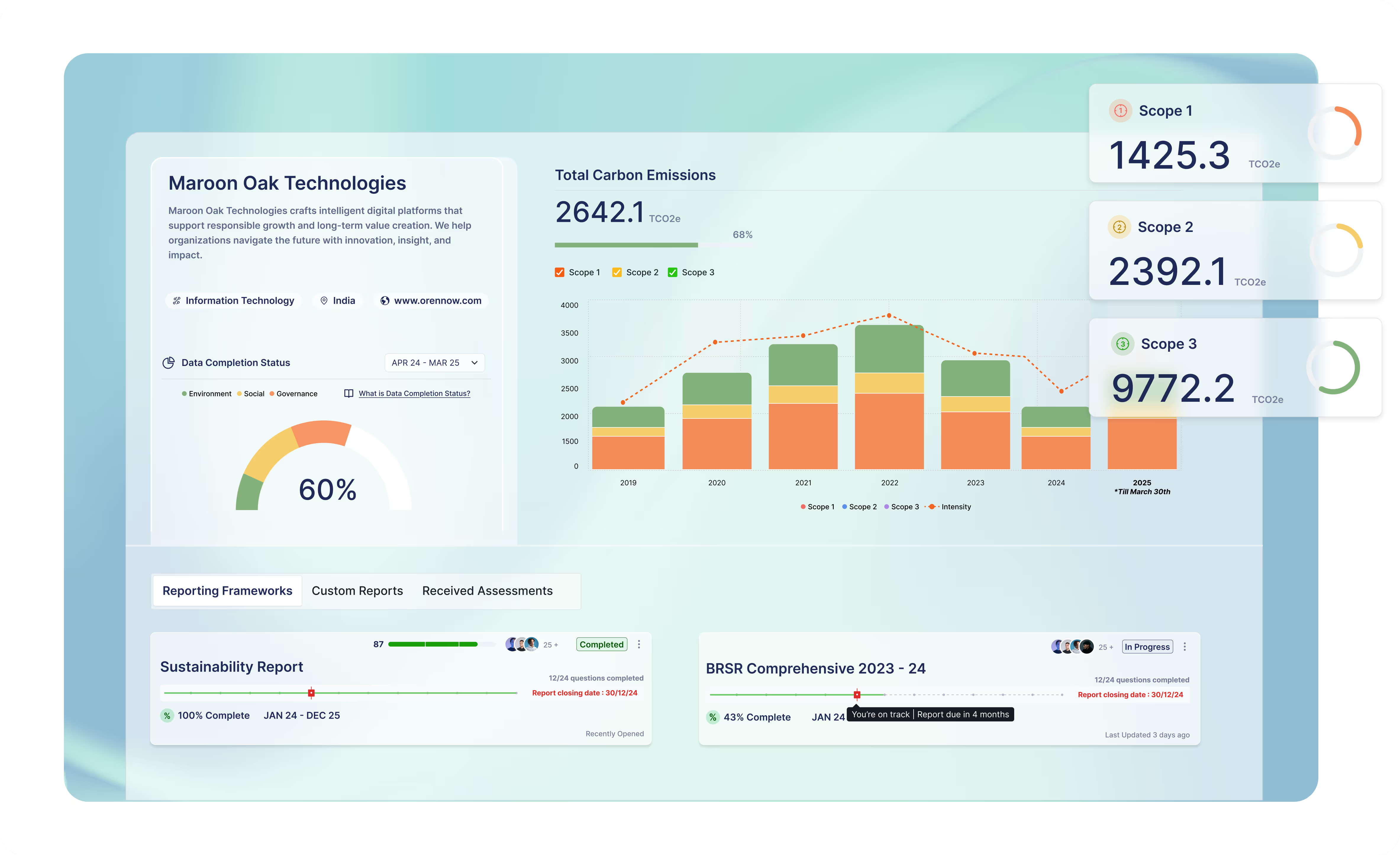How India's Automotive Ancillary Leaders are Leveraging Oren's Sustainability Hub

Introduction: India's Automotive Growth Trajectory
The Indian automotive ancillary sector, which encompasses the production and sale of intermediate equipment and parts used in automobile manufacturing, is experiencing unprecedented growth. The industry achieved a record turnover of ₹5.6 lakh crore ($69.7 billion) in the fiscal year 2022-23, marking a 32.8% increase. Projections suggest that by FY 2028, this sector will be worth INR 9.35 lakh crore ($150 billion), with a compound annual growth rate (CAGR) of 14.74% from FY 2024 to FY 2028.
The automotive ancillary market is a pivotal component of India’s automotive industry and plays a significant role in achieving the nation's ambitious growth targets of 6.5% in the coming decades. This sector remains fragmented, with leading players like Bharat Forge, Mahindra CIE Automotive, Bosch, and Sundram Fasteners dominating their respective sub-verticals.

Catalysts and Bottlenecks to Growth
1. Opportunities in Global Markets
The European and U.S. markets are key export destinations for India's auto-components. As these regions pivot away from Chinese suppliers under the "China Plus One" strategy, Indian manufacturers stand to gain substantial market share. This shift offers a significant opportunity for Indian firms to expand their footprint globally.
2. Regulatory Challenges
However, this opportunity comes with challenges. European Original Equipment Manufacturers (OEMs) have stringent sustainability requirements. The European Commission's adoption of the Corporate Sustainability Reporting Directive (CSRD) in 2021 is a case in point. The CSRD significantly increases reporting requirements and expands the scope of companies required to comply, from approximately 11,700 under the Non-Financial Reporting Directive (NFRD) to around 49,000 companies.
In the U.S., California’s recent SB 253 and SB 261 regulations require companies to disclose carbon emissions across their entire value chains. Additionally, leading Indian manufacturers, especially those in the top 1000 by market cap, are expected to adhere to the Business Responsibility and Sustainability Reporting (BRSR) requirements set by SEBI, starting FY 2023.
.webp)
Overcoming Sustainability Disclosure Challenges
1. Navigating Compliance Frameworks
Organisations face considerable hurdles in sustainability reporting, primarily due to the array of compliance frameworks. From BRSR to GRI, CSRD, CDP, and various customer-specific Supplier Assessments, determining which frameworks apply can be overwhelming. These frameworks often have overlapping disclosure requirements, making it essential to streamline processes with a robust software solution to save time and avoid redundant reporting.
2. Integrating Data Sources
Effective sustainability reporting demands the integration of data from diverse sources, including HR, Operations, Finance, and Sustainability teams. The challenge is compounded by siloed data, where operational data is often fragmented across different departments and locations. A centralised system is crucial for consolidating this data to meet reporting frameworks and disclosure requirements.
3. Establishing Data Ownership and Reporting Processes
Many organisations initially establish ad hoc reporting processes in response to data requests. These processes often fall under the purview of legal or operations teams, who may lack comprehensive visibility and expertise in sustainability. Engaging external sustainability experts or assurance providers can help, but this adds complexity to project management.
4. Focusing Beyond Data Collection
After the initial years of sustainability reporting, companies often realise the need to enhance their metrics. Benchmarking against international suppliers requires a strategic approach to avoid falling behind. Companies should focus on actionable insights rather than just data collection, to ensure they remain competitive and meet sustainability standards.

Working with Oren: Streamlining Sustainability Management
Oren’s Sustainability Hub offers a specialised platform designed for the automotive industry. Here’s how it helps:
- Data Capture and Consolidation: Oren’s platform replicates your organisation’s complexity, creating a digital twin model. This model includes all your offices, plants, warehouses, and fleets, allowing for comprehensive data capture.
- Building a Robust Data Foundation: The Sustainability Hub automates the capture and consolidation of over 500 data types from various sources into a single, auditable system. It integrates internal data with external emission factors and benchmarks, enabling rapid calculation of GHG emissions for Scopes 1, 2, and 3 from existing ERP data.
- One-Click Reporting: With a solid data foundation, generating internal and external ESG reports becomes straightforward. Choose your reporting framework, and Oren’s platform autofills the required indicators, ensuring accurate and efficient reporting.
- Customizable Solutions: Oren’s Hub is customizable to fit your specific needs. You can select material topics relevant to your business and create custom assessments or align with existing standards like GRI and BRSR.
- Actionable Insights: The platform provides intuitive dashboards for communicating findings and generating buy-in from leadership. Oren helps identify cost-effective pathways to decarbonisation and offers insights into high-return actions for driving sustainability across your value chain.
- Enhancing Supply Chain Sustainability: The Sustainability Hub also supports supply chain sustainability by consolidating supplier data and assisting with responsible procurement initiatives. It includes features for custom assessments and Ecovadis evaluations to improve supply chain performance.
What’s Next?
If you’re preparing a sustainability report or facing multiple disclosure requests, Oren’s Sustainability Hub can be a valuable asset. Our team of experts, well-versed in the automotive sector, is ready to help you build a robust sustainability strategy. Contact us to discover how our platform can transform your sustainability efforts and provide a competitive edge.
Latest Blog Posts
Dive into our blog for insights on making your organization more sustainable.
Sustainability Simplified
Wherever you are in your sustainability journey, we help you advance with confidence.
Schedule a Call



.avif)

